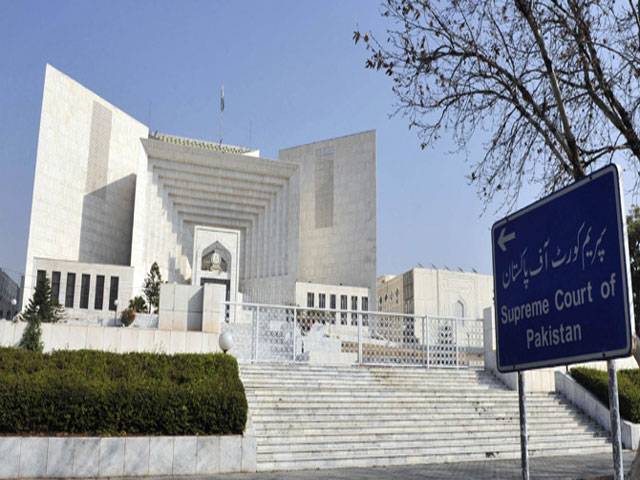ISLAMABAD - The federal government and all the four provinces have supported the establishment of military courts for the trial of terrorists in the country.
The federation’s reply submitted to the Supreme Court said it was wrong that the basic structure of the constitution had been changed through the 21st Constitutional Amendment.
It also stated the 21st Amendment did not usurp the judiciary’s power or put any restrictions. The Objective Resolution was not above and superior to the law and constitution.
The Attorney General’s office filed the reply on the 21st Amendment on behalf of the federation, while the advocate generals of Sindh, Punjab and Balochistan submitted replies on behalf of their respective provincial governments. Khyber Pukhtoonkhawa had submitted its reply in the last hearing.
“This is defining moment for this nation, its people and its institution. At this juncture, we face a choice. In the face of these attacks we can either try and do something concrete and be focused, which can prevent terrorist attacks in the future and can bring perpetrators to justice, or do nothing. These terrorist groups in complete opposition to the constitution want to enforce at gunpoint their ‘ideology’. Either we accept this and let them Talibanise our society and push us to the dark ages or we rise to the occasion and make Pakistan a democratic state based on the Islamic principles of social justice as visualised by the founder of Pakistan Quad-i-Azam Muhammad Ali Jinnah,” says the federation in its reply.
The government pleads that for the sake of all those who have sacrificed their lives in this war, for the sake of our children and for the sake of the future of this country, the people have spoken through their elected representatives, therefore the instant petitions have no merit and are liable to be dismissed.
The federal government while referring the several judgments of the apex court has contended that the courts in Pakistan have never adhered or followed the doctrine of basic structure that bars amendments to the constitution, adding that in 1985, it was expressly provided that there was no limitation on this power to the parliament in the form of Article 239 (6).
The government states that a constitution is a document, which constitutes a social and legal contact between citizens and the state. Over the course of time, it may need to be adapted to adjust to the new realities and circumstances. A constitution is not cast in stone; therefore, it is called a living constitution, which can be amended by the parliament.
It contends that even in United States, the Supreme Court upheld certain unusual actions that were taken during World War-II and no constitutional amendment has ever been set aside in the USA.
The reply further states that the 21st constitutional amendment does not impinge upon the independence of judiciary. The inclusion of certain laws in the First Schedule of the constitution is no negation of the independence of judiciary.
The federal government says that the Objective Resolution does not constitute a ‘ground norm’ adding that Article 2-A is no more supra constitutional document that stands at a footing superior to the constitution of which they constitute a part.
The government has submitted that terrorists have no respect for life and liberty of the citizens of Pakistan, the constitution, the courts and the legal system of Pakistan as these terrorists do not recognise the state of Pakistan as well. It further stated that terrorists deserve a treatment that is different from ordinary citizens of Pakistan.
The federal government says that prosecutors’ and witnesses feel threatened and they feel that they do not have adequate or sufficient protection and there are actual instances were judges, prosecutors and witnesses have been threatened or attacked and killed.
Regarding the enforcement of fundamental rights, the reply contends that under the Pakistani constitutional dispensation, abridgment of fundamental rights has been recognised in certain circumstances, adding that the parliament has the power to pass laws that may abridge fundamental rights; therefore, 21st Amendment may not be set aside on the test of violation of the fundamental rights.
The replies of the federation and the provinces have prayed to the apex court to dismiss the petitions against the 21st Amendment.
Friday, November 22, 2024
Centre, provinces seek to convince SC on 21st Amend
| Federation says in its reply parliament can pass laws abridging fundamental rights in certain situations | Constitution not cast in stone

10:28 PM | November 18, 2024
Govt scheme to provide Rs 1.24bn airfare relief for pilgrims
8:53 PM | November 22, 2024
UN says 2024 'deadliest year on record' for humanitarian aid workers with 281 deaths globally so far
8:46 PM | November 22, 2024
Metro bus service to remain closed on Nov 24 ahead of PTI protest
8:10 PM | November 22, 2024
CM Maryam Nawaz approves scheme to provide three marla plots to people
8:02 PM | November 22, 2024
ATC issues verdict in May 9 case, sentences PTI workers to jail
7:12 PM | November 22, 2024
-
Lahore tops global pollution rankings as smog worsens, AQI reaches hazardous levels
-
Lahore tops global pollution rankings as smog worsens, AQI reaches hazardous levels
-
Hunger crisis to increase in South Sudan, warns UN
-
Pakistan’s judiciary champions climate justice at COP29 in Baku
-
Punjab struggles with persistent smog as Met Office forecast rainfall
-
Punjab residents face escalating smog crisis as pollution levels soar across country
UN Crossroads
November 22, 2024
Smog Trade-off
November 22, 2024
Undersiege Again
November 22, 2024
Land of Vigilantes
November 21, 2024
United in Genocide
November 21, 2024
Proposal to counter increasing cases of harassment
November 22, 2024
Critique of RFE/RL’s Coverage of the SCO Summit
November 22, 2024
Real vs Reel
November 22, 2024
Independent Supreme Court
November 21, 2024
Fat Loss Fantasy
November 21, 2024
ePaper - Nawaiwaqt
Nawaiwaqt Group | Copyright © 2024





